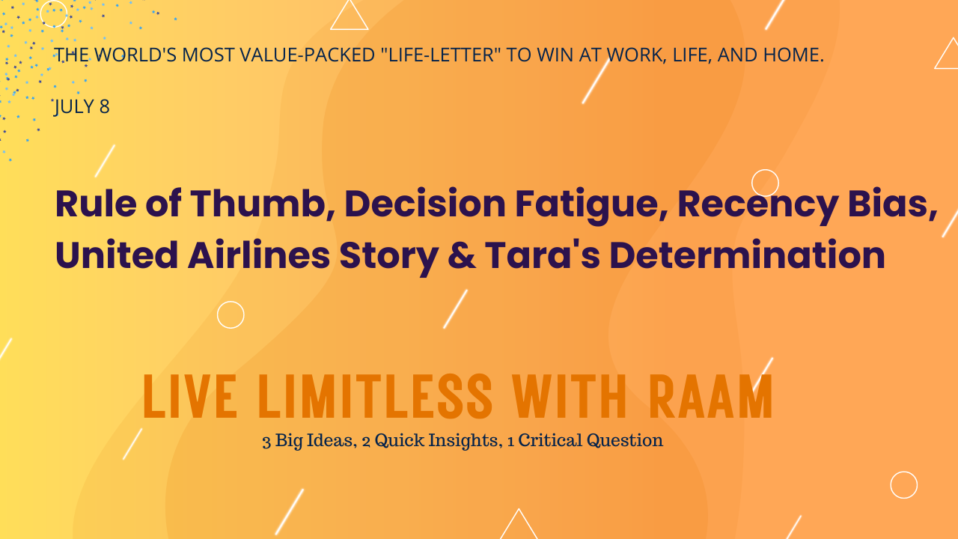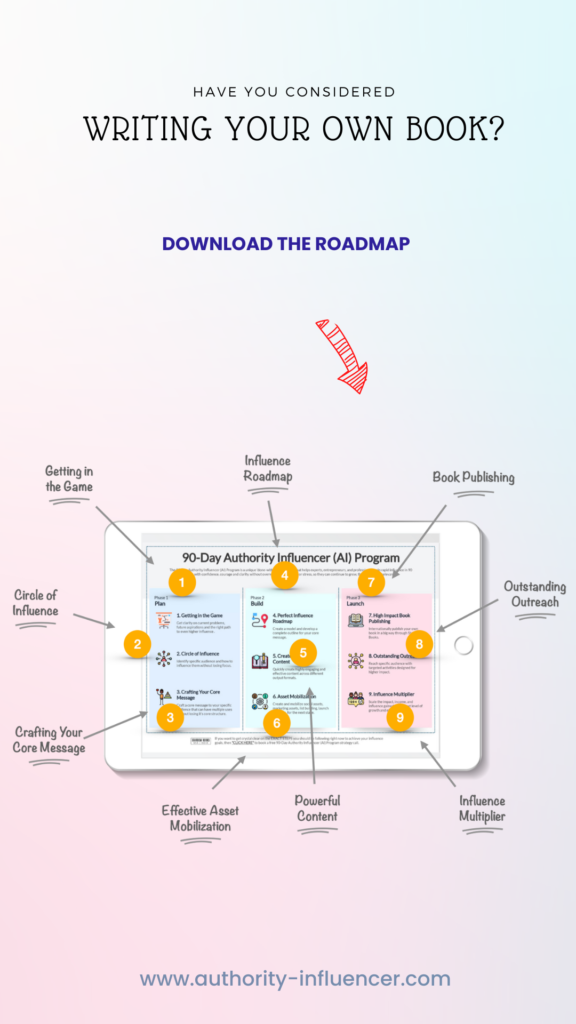Live Limitless with Raam
“The World’s Most Value-packed Newsletter Life-letter to WIN at Work, Life, and Home” with:
3 big ideas, tips or strategies
2 stories, quotes or case-studies
1 critical question to ask yourself
Live Limitless: Rule of Thumb, Decision Fatigue, Recency Bias, United Airlines Story and Tara’s Determination!
read on LIFELETTER.RAAMANAND.COM | JULY 8, 2023
____________
3 Big Ideas, Tips or Strategies for this week
1. Rule of Thumb (Origin)
The phrase “rule of thumb” is believed to have originated from a practice in which craftsmen, particularly those in construction or agriculture, used their thumbs as a rough measurement tool. The width of the thumb, which is approximately an inch, provided a quick, convenient unit of measure for rough estimations when more precise tools were not at hand.
However, the phrase has come to symbolize any broadly accurate guide or principle that is based on experience or common sense rather than precise measurement.
2. Decision Fatigue
Hick’s Law, named after British psychologist William Edmund Hick, proposes that the time it takes for a person to make a decision increases logarithmically with the number of options.
In simple terms, the more choices you present to someone, the longer it takes them to make a decision. This is a crucial concept in fields like UX design and marketing where reducing choice overload can greatly improve user experience and decision-making efficiency.
3. The Recency Bias
This is a cognitive bias that favors recent events over historic ones. This bias can often cause people to think that trends or patterns they observe in the recent past will continue into the future, even if the long-term data suggests otherwise.
For instance, if an investor sees that a certain stock has been doing well over the past few months, they might be inclined to believe that this stock will continue to perform well in the future, even if the overall history of the stock suggests that it might not.
The recency bias reminds us that our perception of events can be significantly influenced by their timing, and we should make efforts to consider all relevant information, not just what is most recent or salient.
_____________
2 Stories, Quotes, or Case-Studies for this week
1. United Airlines Story
In 2017, United Airlines faced immense backlash after a video went viral of a passenger being forcibly removed from an overbooked flight. The passenger, Dr. David Dao, had refused to give up his seat when requested due to overbooking and was injured in the process of being removed.
The incident triggered global outrage and led to a PR disaster for United Airlines. The company’s initial response was seen as inadequate and insensitive, which further fueled the public’s anger.
After a considerable public relations fallout, United Airlines took several steps to improve its customer service policies, including increased compensation for bumped passengers and reduced overbooking.
The incident serves as a stark reminder of the power of social media and the importance of treating customers with respect and dignity. It underlines that in the age of digital connectivity, companies are always under scrutiny and that public opinion can have a profound impact on a brand’s image. It teaches us the critical importance of having strong customer service policies and handling crises effectively.
2. Tara’s Determination
In the book “Educated” by Tara Westover, there’s a fascinating account of Tara’s journey from being homeschooled in rural Idaho with little formal education, to earning a PhD from Cambridge University.
One particular incident stands out. Tara, despite her limited schooling, decides to teach herself enough mathematics and grammar to pass the ACT. This act of self-determination is remarkable in itself, but even more so when she succeeds and earns herself a place at Brigham Young University.
However, her lack of formal education becomes evident in one of her first lectures when she raises her hand and asks what the Holocaust was, having never learned about it. The incident highlights the gaps in her early home education but also showcases her eagerness to learn and her courage to admit what she doesn’t know.
This anecdote serves as a powerful reminder that formal education isn’t the only pathway to knowledge, and it underscores the transformative power of self-education and determination.
_____________
1 Critical Question to Ask Yourself
From the courageous pursuit of knowledge demonstrated by Tara Westover in “Educated,” to the principles of decision-making illustrated by Hick’s Law, life continually reveals that determination and smart strategies can facilitate extraordinary outcomes. Even the simple “rule of thumb” teaches us that practical wisdom and experience can serve as valuable guides. Reflecting on these insights, it’s important to ask yourself: “How can I apply these lessons and principles to make smarter choices and take bolder steps in my own life?”
Did you like this week’s “Life-letter”? Then, don’t keep this to yourself. Share it with others.
Share this life-letter on Twitter, Facebook, Linkedin, WhatsApp or via email.
Or, copy and paste the link below:
http://lifeletter.raamanand.com
Let’s meet again. Until then, Keep Smiling… Believe in Yourself… and Get all the Best Things in Life,
Raam Anand
Publishing Coach to hundreds of first-time authors around the world
Publisher & Chief Editor at Stardom Books (USA/India)
Author of the International Bestseller, Write Now


Post a comment